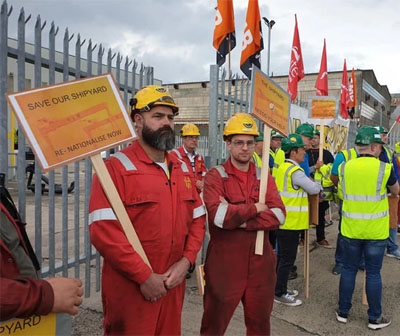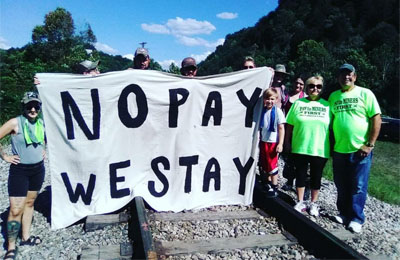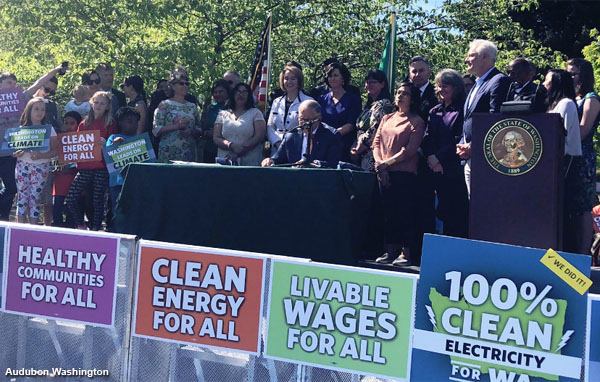OPINION
How unions are fighting climate change
Corporations put profits over workers and the environment. We must join together to demand they protect both.
By APRIL SIMS
(Aug. 29, 2019) — In late July, the owners of the Harland & Wolff shipyard in Belfast, Northern Ireland announced that they were insolvent, and were shutting down operations. The 120 people employed there have occupied the yard around the clock ever since.
 Workers are calling for the plant to be re-nationalized by British Prime Minister Boris Johnson. Buoyed by strong community support, they aim to prevent the plant’s closure and retain their livelihoods. They’re committed to staying – and blocking the administrators attempting to take control of the yard – until their jobs are secured.
Workers are calling for the plant to be re-nationalized by British Prime Minister Boris Johnson. Buoyed by strong community support, they aim to prevent the plant’s closure and retain their livelihoods. They’re committed to staying – and blocking the administrators attempting to take control of the yard – until their jobs are secured.
But they don’t simply want their jobs back, they want to guarantee work for generations, work that offers good-paying union jobs. One of the ways they hope to accomplish this is by calling for the yard to be converted to build renewable energy infrastructure. Per a spokesperson for Unite, the union representing workers at the yard, “There’s massive potential in wind turbines and tidal energy. They’re saying they could create thousands of jobs, and that we need a just transition to renewable.”
In eastern Kentucky, coal miners are blocking a train carrying more than $1 million worth of coal that they dug up with their own hands. They’re demanding that their employer, which declared bankruptcy and laid off all employees with no notice, pay the back wages and benefits they are still owed, totaling more than $4,000 owed on average to each miner.
 While the Blackjewel company closed this mine in an especially heinous manner, mine closures and layoffs are common in the declining coal industry. But for many in the area, mining jobs – when available – are the only way to make ends meet.
While the Blackjewel company closed this mine in an especially heinous manner, mine closures and layoffs are common in the declining coal industry. But for many in the area, mining jobs – when available – are the only way to make ends meet.
“There are no well-paying jobs,” says one miner. “The mining industry is up and down, it’s like a roller coaster. It’s not stable… I was talking to someone the other day… I said we’re probably not going to be able to retire in the mines. You have the issue of climate change, and most companies don’t care about us in the end, all they care about is the dollar.”
That’s a reality that all working people know. Companies care about profits over people, and in a declining industry like coal, this holds even more true.
Changing that reality is one of the central benefits of unions. When working people stand together they have more power to push for just treatment and fair compensation. As the impacts from climate change affect us more and more, that advocacy must also include fighting to maintain family-wage jobs that support communities and restore the environment.
That advocacy has intensified at the state level. Colorado just created an Office of Just Transition, a first-of-its-kind state office tasked with how to maintain labor standards as the state transitions to a clean economy. The legislation that created this office was one of 14 climate-related bills signed into law by Colorado’s governor in 2019, each of them a result of extensive conversations between environmental and labor groups. As a result, they have laid out concrete steps for transitioning workers out of fossil fuel industry jobs and into the renewable energy sector.
It’s a great example of how states, labor unions, community groups, and climate activists can join together to fight the existential threat of climate change while protecting the livelihoods and wellbeing of working families.
Climate change is already hurting us. We have to act. And if employers won’t be accountable to the workers who produce their profits, why would they be accountable to the billions of people whose lives their actions are threatening?
We must hold them accountable.
 In the 2019 legislative session, the Washington State Labor Council, AFL-CIO and many of its affiliated unions worked to pass the Clean Energy Transformation Act (CETA). It requires full decarbonization of Washington’s electricity supply by 2045, but ensures that utilities reduce the cost burden on low-income families and incentivizes renewable energy developers to hire locally and pay livable wages. The CETA is the strongest legislation of its kind in the nation, offering a blueprint for other states to follow.
In the 2019 legislative session, the Washington State Labor Council, AFL-CIO and many of its affiliated unions worked to pass the Clean Energy Transformation Act (CETA). It requires full decarbonization of Washington’s electricity supply by 2045, but ensures that utilities reduce the cost burden on low-income families and incentivizes renewable energy developers to hire locally and pay livable wages. The CETA is the strongest legislation of its kind in the nation, offering a blueprint for other states to follow.
The WSLC has reaffirmed labor’s commitment to supporting climate policy that sustains both a healthy environment and good-paying jobs in successive convention resolutions — in 2017, 2018 and 2019 — and have continued to work with environmental and community groups to achieve these goals.
Internationally, workers are united by common cause, seeking well-paying jobs that sustain both the environment and our communities. These are not opposing ideals. Working people like us, whether we’re occupying shipyards, blocking coal trains, or passing just transition legislation, are showing that we can build an economy sustainable for both working people and the environment.
 April Sims is Secretary Treasurer of the Washington State Labor Council, AFL-CIO, representing the interests of more than 600 union organizations with approximately 550,000 rank-and-file members.
April Sims is Secretary Treasurer of the Washington State Labor Council, AFL-CIO, representing the interests of more than 600 union organizations with approximately 550,000 rank-and-file members.





